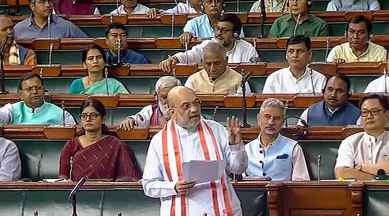Renewal of Criminal Laws: The Center introduces bills to replace the IPC, CrPC and Evidence Law | India News

[ad_1]
The new bills propose repealing the sedition law.

in Comprehensive reform of criminal laws in the colonial eraOn Friday, Union Home Minister Amit Shah introduced three bills in Lok Sabha to replace the Indian Penal Code (IPC), 1860; Criminal Procedure Act, 1973 (originally enacted in 1898); and the Indian Evidence Act, 1872.
Bills – Bharatiya Nyaya Sanhita (BNS), 2023, to replace IPC; Bharatiya Nagarik Suraksha Sanhita (BNSS), 2023, for CrPC; and the Bharatiya Sakshya (BS) Bill, 2023, for the Indian Evidence Act – both have been referred to a standing committee.
from New ruling on mob lynchingpunishable by seven years imprisonment, life imprisonment, or the death penalty; To enable speedy justice through video trials, electronic filing of flight information reports; Expanding the definition of sedition; subjecting corruption, terrorism and organized crime to penal laws; the introduction of community service and solitary confinement as new forms of punishment; holding trials in the absence of the accused; and the expansion of crimes against women in relation to sexual intercourse using “deceptive means” – the new bills provide for fundamental changes in criminal jurisprudence.
You are exhausted
Monthly limit for free stories.
to continue reading,
Simply register or log in
Read on for Indian Express Premium Membership.
This featured article is free for now.
Sign up to read more free stories and access offers from partners.
Read on for Indian Express Premium Membership.
This content is exclusive to our subscribers.
Subscribe now to get unlimited access to exclusive and premium The Indian Express stories.
“I assure the House of Representatives that these three bills will have Indian spirit and spirit, and will bring about a huge change in our criminal justice system,” Shah said. Lok Sabha.
Pointing to freedom fighter Khudiram Bose, he said they would achieve the goal of removing the “slavery mentality” – one of the five pledges (“Panch Pran”) made by the prime minister. Narendra Modi This came in his speech on the occasion of Independence Day last year.
“These three laws have been passed by the British Parliament; Their central theme was the promotion and protection of colonial rule. “Their goal was to punish, not to provide justice,” Shah said. “The new laws that will replace the colonial laws will put at the center and protect the rights of the citizen guaranteed by the constitution. The aim will be to provide justice, not punishment,” he said.
Among the major changes, Shah said, is that the new penal code will put crimes against women and children in the first place, and the provisions of the international penal code on discord will be cancelled.
However, the proposed Bharatiya Nyaya Sanhita Bill contains a clause that penalizes “endangering the sovereignty, unity and integrity of India”. While it does not name discordIt broadens its definition to include assistance through financial means and acts of “subversive activities”, or those that encourage “sentimental separatist activities”.
The sexual exploitation of women under the pretext of marriage, employment, promotions or concealment of identity is a crime. For gang rape, there is a sentence of 20 years or life imprisonment, and the death penalty in case of rape of a minor.
Shah said terrorism was defined under the law for the first time. A terrorist was defined as a person who commits any act in India or in a foreign country with the intent of threatening the unity, safety and security of India, intimidating the general public or a segment of it, or disturbing public order. There is also a provision for seizure of the terrorist’s property.
He said the new laws will reform the criminal justice system and guarantee justice within a maximum period of three years.
The BNSS’s objection statement said the government’s motto is “Sapka Saat, Sapka Vikas, Sapka Vishwas, Sapka Prayas” and that it is committed to ensuring “accessible and expeditious justice” for all citizens consistent with these constitutional democratic aspirations.
According to the proposed bill, the indictment must be filed within 90 days, and the court can grant leave for another 90 days. The investigation must be completed within 180 days and sent for trial. After the trial, the verdict must be issued within 30 days.
Another major change was the provision for a trial in absentia. “Daoud Ibrahim is wanted in many cases. He fled the country. These people are not being prosecuted. We have decided that the Courts of Session, after due process, will declare them fugitives. The trial will be held in absentia and the sentence will be pronounced. They may hide anywhere but judgment will be passed. “This will have a huge impact,” Shah said.
To stop the political use of pardons from punishment by governments, a new provision was put in place stating that death sentences can only be converted to life imprisonment, and life imprisonment may only be pardoned within seven years of sentence.
Most read
Referring to the recent release of criminal politician Anand Mohan in Bihar, Shah said the measure was taken to ensure that politically powerful people do not escape the law.
The minister said that the use of forensic science to increase convictions in cases is also being emphasized. He added: “The goal is to raise the conviction rate to 90 percent.”
⚖️Want to better understand the Centre’s recent comprehensive reform of criminal laws? We’ve got you covered. Check out some of our special reports:
👉🏼 From Video Trials to Community Service as Punishment: The Center’s Reform of Criminal Laws
👉🏼 The main provisions and processes proposed in the bill to replace the CrPC
👉🏼 Expert explains: What does the proposed legislation to reform the criminal justice system mean?
👉🏼 From Video Trials to Community Service as Punishment: The Center’s Reform of Criminal Laws
First published on: 11-08-2023 at 13:23 IST
[ad_2]
Source link





